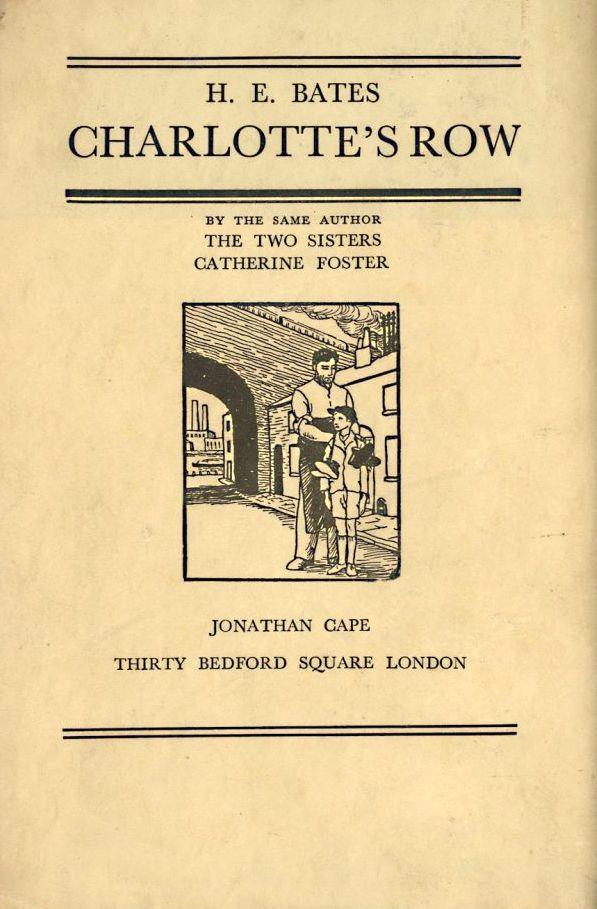
- ID
- a11
- Title
- Charlotte's Row
- Genre
- Novel
- Page Count
- 271
- Word Count
- 59400
- Publisher
- Jonathan Cape
- Jonathan Cape and Harrison Smith
- Publication Year
- 1931
- Document Types
- Social Commentary
- Original Manuscript (mss)
- Topics
- Rushden, Poverty, Shoemakers
London: Jonathan Cape, 1931 (March 30); New York: Jonathan Cape & Harrison Smith.
Dedication: To Henry James Byrom."
Written in 1929 with the provisional title "Early Years," Bates's third novel features a cast of characters in a shoemaking street very similar to that experienced by Bates in Rushden: a young boy modeled after Bates's father, Albert Bates, (who started out in the shoe business at the age of ten) and through whom much of the novel is seen; an idle and and drunken shoemaker; a gentle, book and nature-loving socialist shopkeeper; a passionate and idealistic young woman; a hypocritical Baptist baker (see Bates's bake-house memories in The Vanished World, pp. 69-70); and several wives, either abused or shrewish. A series of episodes depict poverty, hunger, violence, death, and hopelessness and, in doing so, address religious and economic issues and contrast urban and rural life.
David Garnett, writing in Now and Then, called it "a most lovely book, most exciting, most full of promise...The squalor and dirt and beastliness of poverty, and the consolation, lifting your head and seeing the sun chasing the cloud-shadows over the cornfields, that for me is the essence of the book." L.A.G. Strong, in The Spectator, called it "disappointing, not because it is squalid, but because it is unimaginative. Sweat, tuberculosis, and the odours which Mr. Bates so conscientiously describes, are the logical consequences of poverty and over-crowding. We did not need Mr. Bates to tell us this: and Charlotte's Row tells us nothing more - except that its author can write: which, also, we already knew."
The New York Times review was more positive: "What is most ingratiating about him is his scrupulous faithfulness to what he sees and feels. He seems almost conventional at times because he refuses, not merely to exaggerate, but to emphasize. His understanding of life is still youthful and, at times, unformed; and for passion (which he lacks) he can only offer simplicity as a substitute...He does not quite succeed, but he does not altogether fail,and "Charlotte's Row" is worth reading." The Times Literary Supplement suggested that "if an excuse is to be found [for the book]...it must be sought in some kind of propagandist purpose, in the author's desire to arouse our horror at the conditions of slum life in an English industrial town...There is no beauty in the story, but it is at least free from the least taint of sentimentality."
The New Statesman and Nation called it "a fine, painful, uncomfortable book, in which the author's integrity makes the moral far more effective than if he had in the least emphasized it." David Garnett called it "a most lovely book, most exciting, most full of promise...The squalor and dirt and beastliness of poverty, and the consolation, lifting your head and seeing the sun chasing the cloud-shadows over the cornfields, that for me is the essence of the book."
A holograph manuscript is held in the Senate House Library archives at the University of London (https://archives.libraries.lon...).
Reviews:
- The New Statesman and Nation (May 9, 1931, p. 400, attached)
- The New York Times (February 21, 1932, attached)
- Now and Then (Summer 1931, David Garnett, attached)
- Saturday Review of Literature (April 30, 1932, p. 703, attached)
- The Spectator (April 4, 1931, p. 553, L.A.G. Strong, attached)
- Times Literary Supplement (April 23, 1931, p. 324, J.D. Beresford, attached)
- Bookman (June, 1931, p. 172, attached)
- Daily Telegraph (March 31, 1931, p. 6, Howard Marshall, attached)
- Sunday Times (April 19, 1931, p. 11, Ralph Straus, attached)

Downloads
The below reviews and articles are available in PDF format.